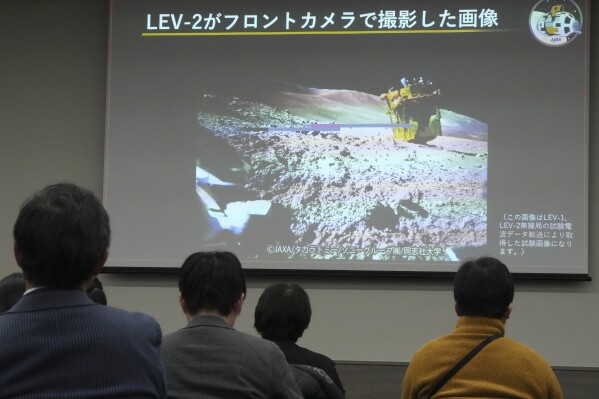뉴스&스피킹(영자신문)
하루 10분이면 영어에 대한 두려움을 극복하고 누구나 유창하게 영어를 구사하실 수 있습니다.
-
 2024 Academy Award Nominees: Surprises, Snubs and Fun Facts The Academy of Motion Picture Arts and Sciences on Tuesday announced the nominees for Hollywood’s highest movie awards --- the Oscars. As usual, there were surprises. And there were snubs, meaning filmmakers or films that were rejected as candidates. Here are some of the facts about this year’s nominees.
2024 Academy Award Nominees: Surprises, Snubs and Fun Facts The Academy of Motion Picture Arts and Sciences on Tuesday announced the nominees for Hollywood’s highest movie awards --- the Oscars. As usual, there were surprises. And there were snubs, meaning filmmakers or films that were rejected as candidates. Here are some of the facts about this year’s nominees.
Fostering the Oscars
Actor Jodie Foster was nominated for her performance in a supporting role in the film Nyad. It is her fifth nomination. The first came 47 years ago when she was just 14 years old.
This year she returns as a nominee after an unusually long absence from the Oscars. Her last nomination was for Nell in 1995.
Foster has won two Academy Awards as a lead actor. Her first came in 1989 for the movie The Accused. She won again in 1992 for the film The Silence of the Lambs. Her costar in Nyad, Annette Bening, is also nominated for an Oscar in the best performance by a lead actress category. Like Foster, Bening has been nominated four other times. But she has yet to win any Academy Awards.
Foster has more nominations than the rest of the actors in her category combined. Emily Blunt, Danielle Brooks, America Ferrera and Da’Vine Joy Randolph are all first-time nominees.
Foster's gap between nominations is not a record, though. Last year, actor Judd Hirsch got his first nomination in 42 years for his performance in The Fabelmans.
John Williams dials in on Disney with ‘destiny’
Music writer, or composer, John Williams, is back in the running for an Oscar. The 91-year-old became on Tuesday the oldest nominee in history for his original score for Indiana Jones and the Dial of Destiny. Williams broke the age record of 90 set last year by nominee John Williams.
The composer has been nominated for 54 Academy Awards. He is the most Oscar-nominated living person. He needs six more to overtake Walt Disney’s record of 59 nominations.
Williams has won five Oscars. His last was in 1994 for the score of Schindler’s List, which also won the award for best picture.
Women's films honored, women snubbed
A record three films directed by women were nominated for best picture: Barbie from Greta Gerwig, Anatomy of a Fall from Justine Triet, and Past Lives from Celine Song.
But only one of them – Triet – received a best director nomination.
Gerwig's snub, along with Barbie star Margot Robbie's in the best actress category, were widely protested after the nominations were announced Tuesday. But each is still in the larger group of nominees. Robbie is a producer who will get an Oscar if Barbie wins best picture. And Gerwig is nominated for best adapted screenplay.
The spirit of Spielberg and scores for Scorsese
Director Steven Spielberg was a 2024 Oscar presence even on a year off. Spielberg did not direct a movie last year that met time limits for Academy Award consideration. However, he is nominated as a producer of the movie Maestro.
If it wins best picture, Spielberg will take home his fourth Oscar.
Martin Scorsese, meanwhile, broke Spielberg’s record on director nominations. Scorsese is nominated this year for the movie The Killers of the Flower Moon.
I’m Caty Weaver.View -
 US Scientist’s Advice Shocks British Tea Drinkers An American scientist has started a tempest in a teapot by offering Britain advice on its favorite drink: tea.
US Scientist’s Advice Shocks British Tea Drinkers An American scientist has started a tempest in a teapot by offering Britain advice on its favorite drink: tea.
Tempest in a teapot is an expression to describe a strong, noisy, and angry reaction over something small or unimportant.
Michelle Francl is a chemistry professor at Bryn Mawr College, outside of Philadelphia, Pennsylvania. She said tea drinkers should add a little salt to make a perfect cup of tea.
That advice is included in her book Steeped: The Chemistry of Tea. The book was published Wednesday by the Royal Society of Chemistry.
Mixing tea with salt water has never gone well for British-American relations. In 1773, American colonists in Boston, Massachusetts, were angry at Britain for adding more taxes to raise money. So they dumped British tea into the sea. The event became known as the Boston Tea Party. It led to the start of the American Revolution.
Francl’s suggestion caused outrage among tea lovers in Britain. They see Americans as coffee drinkers who know nothing about tea. And they think if Americans drink tea at all, they just heat water in a microwave.
“Don’t even say the word ′salt′ to us...” said the etiquette guide Debrett’s on the social media service X, formerly known as Twitter.
Even the U.S. Embassy in London joined the tempest in a teapot. In a social media post, it promised “the good people of the U.K. [United Kingdom] that the unthinkable notion of adding salt to Britain’s national drink is not official United States policy.”
“Let us unite in our steeped solidarity and show the world that when it comes to tea, we stand as one,” the embassy said in the post. “The U.S. Embassy will continue to make tea in the proper way - by microwaving it," it added.
The embassy later said that the post was “a lighthearted play on our shared cultural connections” rather than an official press release.
Francl's book Steeped, however, is no joke. The advice, its publisher said, comes from three years of research and experimentation with more than 100 chemical compounds. The book, the publisher added, “puts the chemistry to use with advice on how to brew a better cup.”
Francl said adding a small amount of salt — not enough to taste — makes tea seem less bitter. This is because “the sodium ions in salt block the bitter receptors in our mouths," she explained.
She also suggests making tea in a warmed pot, shaking the tea bag around, and serving tea in a short and wide cup to keep the heat. And she says milk should be added to the cup after the tea and not before – another issue that often divides tea lovers.
Francl has been surprised by the reaction to her book in Britain.
“I kind of understood that there would hopefully be a lot of interest,” she told The Associated Press. “I didn’t know we’d wade into a diplomatic conversation with the U.S. Embassy.”
I'm Ashley Thompson.View -
 Japan’s Moon Lander Hits Its Target Japan Aerospace Exploration Agency, or JAXA, said Thursday that its first lunar mission landed within 100 meters of its target over the weekend.
Japan’s Moon Lander Hits Its Target Japan Aerospace Exploration Agency, or JAXA, said Thursday that its first lunar mission landed within 100 meters of its target over the weekend.
Japan became the fifth country to reach the moon when the Smart Lander for Investigating Moon, or SLIM, touched down on the moon early on Saturday. But trouble with the spacecraft’s power system made it difficult to know whether it landed in the target area at first.
Earlier moon landers targeted landing areas as large as 10 kilometers. However, with its improved accuracy, Japan’s SLIM aimed at a target area of just 100 meters.
Shinichiro Sakai is JAXA’s project leader for the lander. He said, "We proved that we can land wherever we want.” Sakai hoped that it would bring more missions “to try to land on unexplored places on the moon."
One of the lander's two main engines stopped working during the landing, causing SLIM to move 55 meters away from the target area to another position, Sakai said. Without engine trouble, he said SLIM could have landed as close as three to four meters from the target. However, the spacecraft could not produce power after landing. JAXA scientists said its solar panels might be facing the wrong direction.
JAXA said it received all data about the touchdown within the two hours and 37 minutes before the lander lost power. Officials said there is still hope the craft will be able to recharge when that side of the moon enters daytime in the coming days.
The power outage meant the lander's camera could only capture low-resolution images, JAXA said.
Moon sniper
The goal of landing within a target area of less than 100 meters led scientists to call SLIM the "moon sniper.”
It used "vision-based" guidance that JAXA says could be a powerful tool for future exploration of the moon’s mountainous areas. These areas might hold resources of fuel, water and oxygen.
Japan follows the United States, the former Soviet Union, China and India as nations reaching the moon's surface. The mission was the result of 20 years of work on precision technology by JAXA.
JAXA has experience with difficult space landings. Its Hayabusa2 spacecraft, launched in 2014, touched down twice on the 900-meter-long asteroid Ryugu. Hayabusa2 collected material that was returned to Earth for scientific research in 2020.
In the past year, three lunar missions have failed. One by Russia's space agency; one by a private Japanese company and another by a private U.S. company. However, more lunar landers will head to the moon this year.
U.S. company Intuitive Machines aims to launch its IM-1 lander in mid-February. China plans to send its Chang'e-6 spacecraft to the far side of the moon in the first half of the year. And the American space agency NASA is planning its lunar polar exploration rover VIPER for November.
I’m Gena Bennett.View -
_3441_1image.jpg) ‘Deepfake’ of Biden’s Voice Called Early Example of US Election Disinformation A fake voice message claiming to be U.S. President Joe Biden was recently sent to voters in an example of possible election disinformation.
‘Deepfake’ of Biden’s Voice Called Early Example of US Election Disinformation A fake voice message claiming to be U.S. President Joe Biden was recently sent to voters in an example of possible election disinformation.
The voice message is an example of what is known as a “deepfake.” A “deepfake” is a piece of audio or video created to make it appear that people in it are saying or doing things that they never did. Newly developed artificial intelligence (AI) tools make it easier for people to make and publish such content.
The fake voice of Biden was included in a political message sent by telephone directly to voters in the northeastern state of New Hampshire. This marketing method, known as “robocalling,” involves a machine that calls large numbers of people to play them a prerecorded message.
The calls are being investigated by New Hampshire election officials. The state recently held America’s first presidential primary contest. Primary elections in the United States usually choose the candidates for the presidential election in November.
It is not known who created the fake audio, which was heard by reporters from several news organizations. In it, Biden seems to try to persuade voters not to take part in the primary.
The voice says, “Voting this Tuesday only enables the Republicans in their quest to elect Donald Trump again.” The message continues, “Your vote makes a difference in November, not this Tuesday.”
Voting in state primaries does not affect a person’s vote later in the U.S. presidential election, which is set for November 5, 2024.
The Biden robocalls even included language the U.S. president has often used in the past, specifically the phrase, “What a bunch of malarkey." The phrase is used to describe something foolish, unreasonable or meaningless. The phone message advises listeners to “save your vote for the November election.”
It is not known how many people received the call with Biden’s voice. Biden did not campaign in New Hampshire and his name was not on the state’s primary ballot. This is because his campaign decided to begin the primary process in the state of South Carolina instead. However, a New Hampshire state law requires it to hold the nation’s first primary.
White House press secretary Karine Jean-Pierre confirmed the call was “fake and not recorded by the president.” The campaign for former President Donald Trump said it was not involved with the call.
The head of Biden’s re-election campaign, Julie Chavez Rodriguez, said in a statement the organization was investigating the incident and “actively discussing additional actions to take.” Rodriguez said the robocall was a clear attempt “to suppress voting and deliberately undermine free and fair elections.”
Robert Weissman is head of the nonprofit citizen activist group Public Citizen. He said in a statement the Biden robocall provided fresh evidence that “the political deepfake moment is here.” He urged governments to consider passing legislation to limit the use of deepfakes to prevent election “chaos.”
Deepfakes created with AI technology have already appeared in campaign advertisements in the 2024 presidential race, the Associated Press (AP) reports. The technology has also been used to spread false information during election campaigns across the world, from Slovakia to Indonesia to Taiwan.
Hany Farid is a digital investigations expert at the University of California, Berkeley. He told the AP the Biden robocall demonstrates how AI methods can be “weaponized” in elections. Farid added that recent cases of audio and video used to mislead voters “is surely a sign of things to come.”
As AI technologies improve, governments around the world are seeking ways to restrict them from causing public harm. The U.S. Congress has yet to pass legislation to limit the use of such technologies in the political process. The Federal Election Commission is currently considering public comments on a petition for it to restrict AI-created deepfakes in campaign advertisements.
David Becker heads the nonprofit Center for Election Innovation and Research. He told the AP the use of deepfakes is just the latest tool in a long history of “dirty tricks” aimed at influencing the political process.
Becker added that the goal of such efforts can be to confuse voters to a point where they no longer recognize false information from the truth. “They don’t need to convince us that what they’re saying, the lies they’re telling us, are true,” he said. "They just need to convince us that there is no truth, that you can’t believe anything you’re told.”
I’m Bryan Lynn.View -
 there is no contents.View
there is no contents.View

